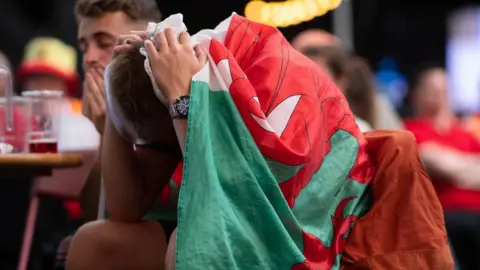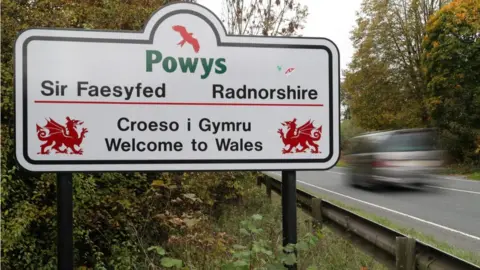Euro 2020: Will Wales fans support England in final?
 Getty Images
Getty ImagesBrexit, Covid-19 and the Euro 2020 final are three things that may appear to have little in common.
But are they all helping to shape our identity as Welsh, British, or both?
When England take the field in the Euro 2020 final on Sunday, they will be cheered by some the other side of the Severn, with others supporting Italy.
Whether you back the Three Lions or not comes down to a complex social identity with layers similar to a Russian doll, said psychologist Dr Simon Williams.
"Different layers become more prominent on different occasions and in different contexts," the Swansea University behaviour expert said.
"So, for example, watching the Olympics, we might identify, along with a friend from England, as all being Team GB - that is Great British. Watching the Euros, we might connect more with our Welsh identity and our friend with their English identity.
"Watching club football, we might narrow our identity further and connect with our identity as a Swansea fan, while a fellow Welsh friend focused in on their identity as a Cardiff fan."
 Getty Images
Getty ImagesWhat separates it from mere sporting tribalism, though, is a "long and complex history" linked to Wales' status as a distinct nation, with its own political and cultural identity separate from England, Dr Williams added.
He believes developments over the past few years have led Welsh people to contemplate this more than ever.
During the pandemic, for example, a distinct border in terms of rules emerged for the first time in centuries, while a Welsh first minister was leading the efforts in the crisis rather than a British prime minister.
Dr Williams said: "Whereas before, a person living in Wales might have had a sense of a dual identity as Welsh and British, now, if they were in favour of remaining in the European Union, they might have more of a sense of being Welsh and European, which might weaken their sense of connection to a British identity and therefore their willingness to support England.
"Identity is key to understanding why some Welsh fans are willing to support England and others prefer to support anyone England is playing."
 Getty Images
Getty ImagesHowever, as we live an increasingly cosmopolitan age, with more migration and mobility than ever before, Welsh people now have closer ties with England - in the form of close or extended family, friends and colleagues - than they would have had a few generations ago.
"So, this might be another factor behind why some Welsh fans are more willing than others to support England as their second team," he said.
Another factor is historically "Welshness" being defined as something different to England, with Dr Williams adding: "In extreme cases, this manifests as anti-Englishness and discrimination.
"More often than not, however, it is intended in a harmless and playful way - that is as banter."
But overall, perhaps geography is the biggest factor.
"Rivalry is often territorial - think local derbies - which is why England and Wales, and England and Scotland are big rivalries," said Dr Williams
The layers Dr Williams described as being more prominent at different times is perhaps evident in a number of situations - such as at Euro 2016, when footage emerged of the Wales team cheering as England lost to Iceland in the last 16.
In that tournament, Wales reached the semi-final, but with the side failing to emulate the success at Euro 2020, defender from that tournament James Collins threw his weight behind England.
"If Wales don't go and win it, I'm supporting England as far as they can go," he said.
He was not the only one, with former Wales rugby union and Great Britain rugby league star Jonathan Davies tweeting: "Come on England, Wales and Scotland are out so come on carry the UK flag", before adding: "I knew it would split opinion but there you go."
 Getty Images
Getty ImagesThere is another factor which could influence how much support England receive in Wales - 636,000 people (21% of the population) were actually born over the border, according to the 2011 census.
It also found 34.1% of the population have no Welsh identity, with the figure highest in Flintshire (57.3%), Conwy (52.4%) and Powys (52.4%).
However, if identity is the biggest determinant, as Dr Williams suggest, 66% who responded to the census expressed their national identity as Welsh, with it highest in areas of the south Wales valleys - more than 70% in Neath Port Talbot, Rhondda Cynon Taf, Blaenau Gwent and Caerphilly.
John Cook from Llanbradach, Caerphilly, said "as a Welshman, I could never support England", adding: "I was living in England a few years ago and had nothing but abuse because I'm Welsh and love Wales."
A poll of 2,000 fans conducted by YouGov for Betfair before the tournament found 47% of Wales supporters would back England.
Allow X content?

The situation could be even more complicated though due to Sunday's opponents - there were once 300 Italian cafes in Wales, with thousands claiming heritage from the country.
Wales' former world champion boxer Joe Calzaghe tweeted "Forza Italia" following one of the country's previous wins, while others including Chiara Bertelli, 42, who lives in Swansea, will also be supporting the land of their fathers.
 Chiara Bertelli
Chiara BertelliHer dad hails from Loano in northern Italy and she said: "We've always supported Italy in my house growing up, in football especially, and I will be on Sunday.
"We generally supported England after Italy in the World Cup or Euros as Wales often didn't make it through, but now Wales have become more competitive, it makes it more interesting."
While she admitted she likes Gareth Southgate and the English players, Chiara added: "I'm pleased for them they have gotten this far, but as a nation Italy will always get my support.
"If it was Italy versus Wales, though, I would be far more torn, obviously."

- MEET WALES' OWN PIZZA BOYS: The boys set off on an adventure to push their pizza making skills to the limit
- HELL ON WHEELS: Spend some time with Wales’ first roller derby team, the Tiger Bay Brawlers
